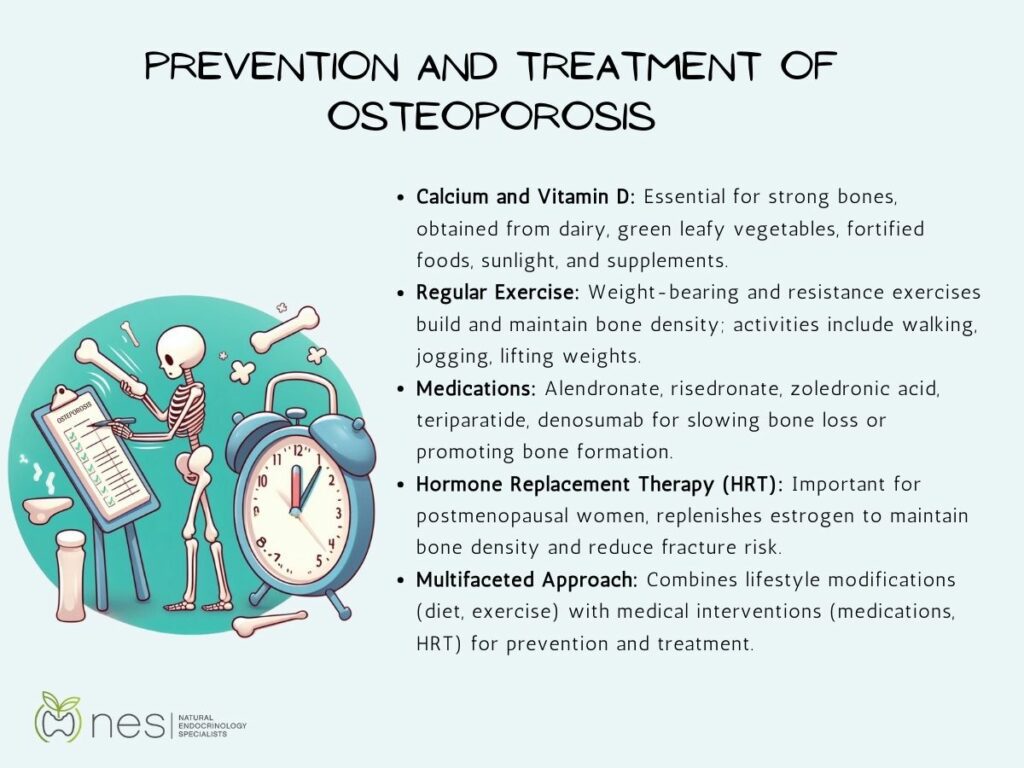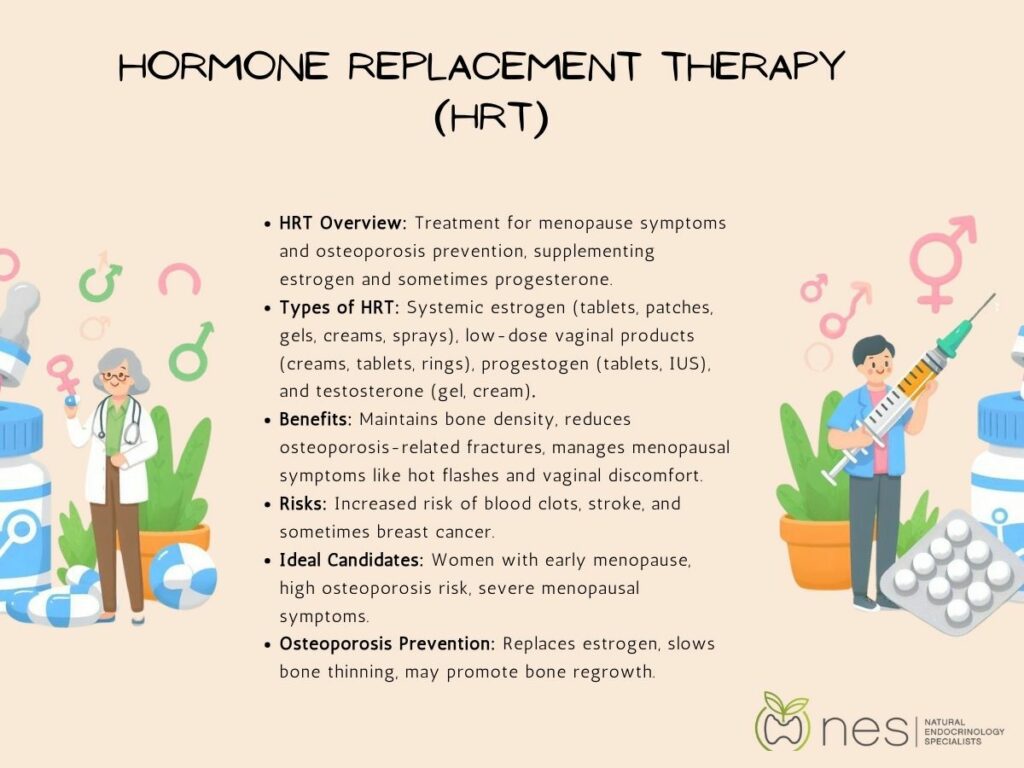Osteoporosis, a condition marked by weakened bones and an increased risk of fractures, is a significant health concern, especially as we age. Hormone Replacement Therapy (HRT) has emerged as a beacon of hope in this realm, offering not just relief but also a proactive approach to managing and potentially reversing the effects of this bone-thinning […]

Osteoporosis, a condition marked by weakened bones and an increased risk of fractures, is a significant health concern, especially as we age.
Hormone Replacement Therapy (HRT) has emerged as a beacon of hope in this realm, offering not just relief but also a proactive approach to managing and potentially reversing the effects of this bone-thinning disease.
This blog delves into the intersection of HRT and osteoporosis, exploring how replenishing certain hormones can fortify bone density and resilience. We will unravel the science behind HRT, its benefits, and considerations, providing a comprehensive view for those seeking to understand and combat osteoporosis effectively.
Osteoporosis, a condition characterized by fragile bones, is a major health concern, particularly as individuals age. Understanding the risk factors is crucial in both prevention and treatment.
Here, we delve into key elements that contribute to this condition, highlighting why some individuals are more susceptible than others:

As people age, their bone density naturally decreases. This process accelerates in women post-menopause, making them particularly vulnerable to osteoporosis. Over 50 have a significantly higher risk of developing osteoporosis compared to men.
This gender disparity underlines the importance of early intervention and tailored treatment plans, especially for women as they age.
Osteoporosis can run in families, indicating a strong genetic component. Individuals with a family history of osteoporosis or fractures should be particularly vigilant.
Although genetics can't be changed, understanding this risk can guide proactive measures to strengthen bone health from an early age.
The link between menopause and osteoporosis is undeniable. During menopause, women experience a sharp decline in estrogen, a hormone crucial for maintaining bone density. This drop significantly increases their risk of developing osteoporosis.
Recognizing this connection is vital for women approaching menopause age, as it opens avenues for preventive care, including Hormone Replacement Therapy (HRT).
While menopause is a common cause of reduced estrogen, other factors can also lead to low estrogen levels, contributing to osteoporosis.
These include certain medical conditions and treatments that affect hormone levels. Maintaining a balance of hormones is, therefore, integral to bone health, regardless of age or gender.
Long-term use of glucocorticoids, often prescribed for chronic conditions like asthma or rheumatoid arthritis, can lead to decreased bone formation and increased bone resorption. This side effect underscores the importance of monitoring bone health in individuals undergoing such treatments.
Preventing and treating osteoporosis involves a multifaceted approach, combining lifestyle modifications and medical interventions. By addressing the condition from various angles, individuals can significantly improve their bone health and reduce the risk of fractures.

Calcium and vitamin D are the cornerstones of bone health. Adequate intake of these nutrients is crucial for maintaining strong bones.
Dairy products, green leafy vegetables, and fortified foods are excellent sources of calcium, while vitamin D can be obtained from sunlight exposure and dietary sources. Supplements may also be recommended, especially for those at high risk of deficiency.
Physical activity, particularly weight-bearing and resistance exercises, is essential in building and maintaining bone density. Activities like walking, jogging, and lifting weights not only strengthen muscles but also help improve bone strength.
Regular exercise, is therefore, a key component in both preventing and treating osteoporosis.
Several medications are available to treat osteoporosis, including alendronate, risedronate, zoledronic acid, teriparatide, and denosumab. These drugs work in various ways to either slow bone loss or promote bone formation.
The choice of medication depends on individual factors such as the severity of bone loss, age, and overall health.
HRT plays a significant role in both preventing and treating osteoporosis, particularly in postmenopausal women.
By replenishing estrogen levels, HRT helps maintain bone density and reduce the risk of fractures. However, HRT is not suitable for everyone and requires careful consideration of its benefits and risks.
Hormone Replacement Therapy (HRT) stands as a pivotal treatment option for managing menopause symptoms and preventing osteoporosis, particularly in women. This therapy involves supplementing the body with estrogen, and sometimes progesterone, to mitigate the hormonal fluctuations experienced during menopause.

HRT comes in various forms, each tailored to individual needs and health profiles. The primary types include:
The benefits of HRT are significant, especially in the context of bone health. It helps maintain bone density and reduce the risk of fractures due to osteoporosis. Additionally, it effectively manages other menopausal symptoms, like hot flashes and vaginal discomfort.
However, HRT is not without risks. It can increase the likelihood of certain health issues, such as blood clots, stroke, and in, some cases, breast cancer. Therefore, evaluating these risks in consultation with a healthcare provider is crucial.
Ideal candidates for HRT are typically women experiencing early menopause, either naturally or due to surgical intervention, and those who are at a high risk for osteoporosis.
Women suffering from severe menopausal symptoms that affect their quality of life may also be considered. Assessing individual health history, risk factors, and preferences is essential when determining suitability for HRT.
HRT can significantly aid in preventing bone loss and reducing fracture risk in postmenopausal women. By replacing estrogen, which plays a key role in maintaining bone density, HRT slows down bone thinning and can even lead to some degree of bone regrowth.
While medical treatments like HRT are important, lifestyle modifications are crucial in preventing osteoporosis.
As we explore the realm of Hormone Replacement Therapy and its role in combating osteoporosis, it's crucial to acknowledge another facet of hormonal health: the emotional impact of hormone imbalances.
Hormones play a pivotal role not only in our physical well-being but also in our emotional and mental health. Fluctuations in hormone levels, whether due to menopause, thyroid issues, or other conditions, can lead to a range of emotional responses, from mood swings to anxiety and depression.
In our next blog, we will delve into understanding and coping with these emotional challenges, offering insights and strategies to manage the psychological aspects of hormonal imbalances.

Acupuncture Session - $189.00
Acupuncture, Package of 4 - $636.00
Female Pellet Insertion Package - $518.00
Male Pellet Insertion Package - $744.00